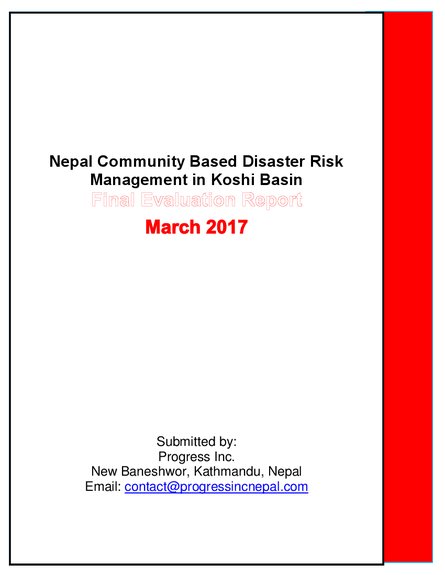
Classified as a global ‘hotspot’ (World Bank, 2005), Nepal is vulnerable to multiple natural disasters, suffering an average of 900 natural disasters each year resulting in lost lives and damaged livelihoods (MoHA, 2009). The Natural Disaster Relief Act, 1982 of Government of Nepal (GON) is the first Act so far that recognizes earthquake, fire, storm, flood, landslide, heavy rainfall, drought, famine and epidemics as disaster.
Disasters often have significant impact on social, economic, cultural and environmental systems. Despite some extent of growing understanding and acceptance of the importance of Disaster Risk Management (DRM), people are not fully aware of the causes and consequences of hazards; on the other hand, they have limited access on the information. Thus, there is an urgent need to redress the proactive policies related to natural disasters, with emphasis on preparedness, rescue, relief management, and rehabilitation. In this context, the Nepal Risk Reduction Consortium (NRRC) recognizes the value of empowered communities as a key driver to reduce vulnerability to natural disasters. The NRRC Flagship 4, led by the International Federation of Red Cross and Red Crescent Societies (IFRC) and the Ministry of Federal Affairs and Local Development (MoFALD), is taking the lead in reducing vulnerability to natural disasters through community based disaster risk reduction.
In the same context, IFRC implemented an integrated community-based resilience project in the Koshi River basin since 1 June 2013 to 31 December 2016 and World Bank was one of the partners to support this. In addition to World Bank, Nepal Red Cross Society (NRCS) and IFRC worked in partnership with American Red Cross, Japanese Red Cross, Norwegian Red Cross, and Zurich Alliance for the project. This project targeted a total of 25 vulnerable communities in five most vulnerable districts in the Koshi basin. These districts included - Saptari, Sunsari, Udayapur, Khotang and Bhojpur. Health, water, sanitation and hygiene promotion (WASH), disaster risk reduction (DRR), livelihood, organizational development and capacity building were the major components of the programme carried out in areas that are at risk of different hazards.
